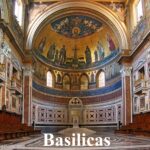
What Catholics believe to be true about God and how they live out their spiritual lives are guided by doctrines, dogma, and disciplines of the Catholic Church.
Doctrine refers to the what the Catholic Church officially teaches about faith in God and living a moral life. All of the Church’s doctrine must be adhered to by Catholics.
One level of the Church’s doctrine consists of teachings that, although not claimed to be revealed explicitly by God, are infallible and guaranteed to be true. Another level consists of common beliefs that are not infallible.
While the Church’s doctrine may be refined and clarified over time as the Church gains more knowledge, it may never contradict the truths found in the Deposit of Faith.
Some doctrine is elevated as dogma, the highest form of revealed truth which cannot change. These teachings have been revealed by God and are infallibly defined as divine revelation by a universal Church council or formal statement from a pope.
Many dogmas were declared in response to certain challenges and specific heresies. Others were formulated to clarify or emphasize the Church’s teaching.
Most of the Church’s doctrine has not needed to be solemnly defined as dogma because it has been clearly understood and believed throughout the history of the Church.
Disciplines are doctrines of the Church put into practice. These customs or traditions may change according to time and circumstances, but they must be followed by all Catholics while they are in effect.
Some teachings change while others do not:
There are different levels of Catholic teaching:
As they traveled from city to city, they handed on to the people for observance the decisions reached by the apostles and presbyters in Jerusalem. Day after day the churches grew stronger in faith and increased in number.
Acts 16: 4-5
Catholic teaching is a living thing:
Catholic doctrine becomes refined over time:
At this juncture the significant words of St. Vincent of Lérins come to mind: “The Church of Christ, the concerned and careful guardian of the dogmas entrusted to her, never changes anything in them; she removes nothing and adds nothing; she does not cut what is necessary and does not add what is unnecessary; she never loses what is hers and never appropriates what belongs to others; but with all zeal, she attends faithfully and wisely to the ancient dogmas and desires only to perfect and hone those which had in ancient times been given an initial form and first outline, to strengthen and reinforce those which are already prominent and developed, and to preserve those which have already been confirmed and defined”
Pope John Paul II, Address to the Conference Studying the Implementation of the Second Vatican Council, 27 February 2000
Some doctrine rises to the level of dogma:
Not all teaching has been solemnly defined:
There is an organic connection between our spiritual life and the dogmas. Dogmas are lights along the path of faith; they illuminate it and make it secure. Conversely, if our life is upright, our intellect and heart will be open to welcome the light shed by the dogmas of faith.
Catechism of the Catholic Church 89
Doctrine guides Catholics in their faith:
The Truth, Goodness, and Beauty of the Catholic Church
Interesting Catholic facts:
Share this page with friends and family to start a conversation about your faith.
Don’t miss a post. Learn more about the Catholic Church and strengthen your Catholic faith.
Find more Fiercely Catholic video issues here.
Subscribe here.


